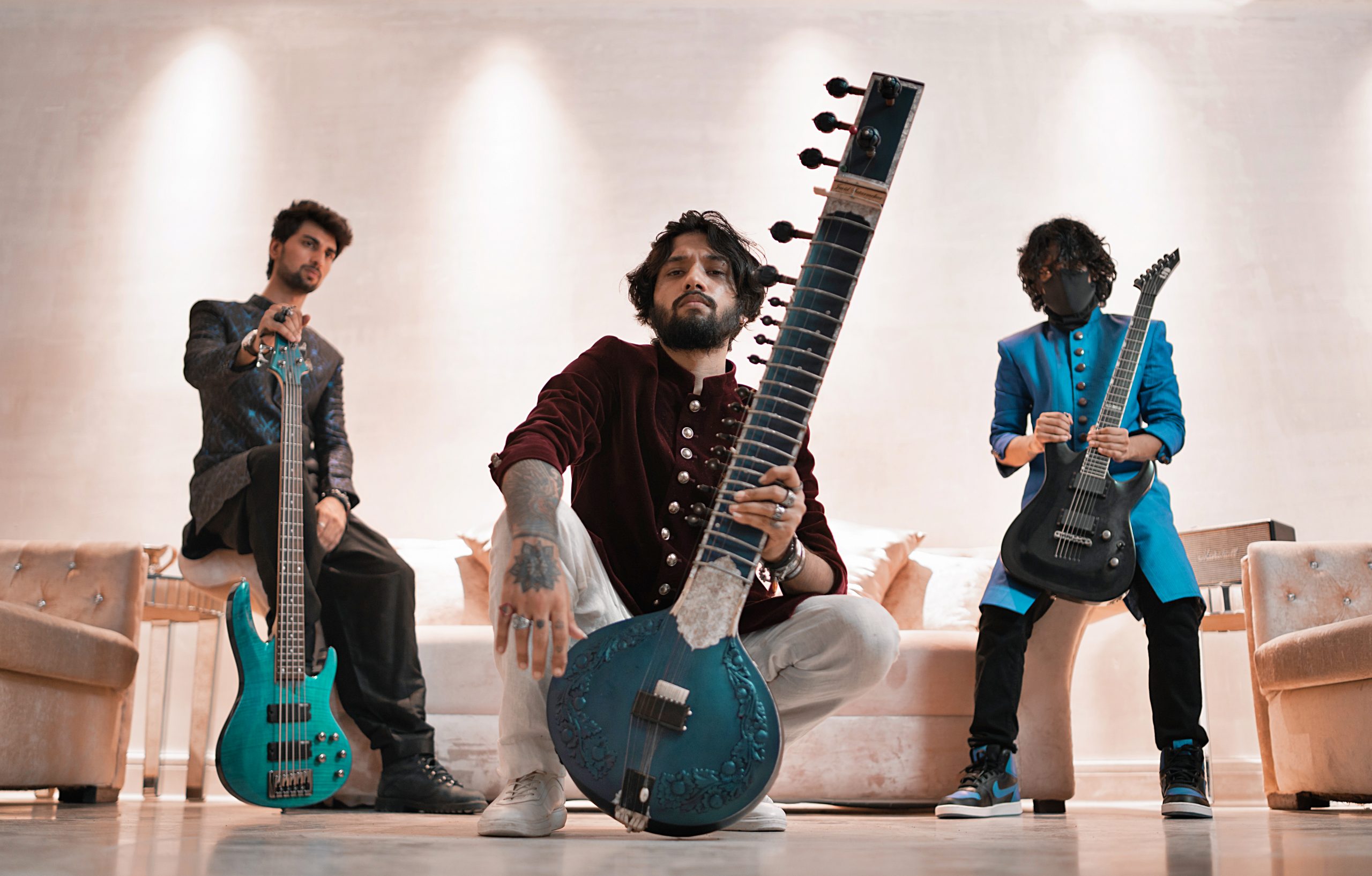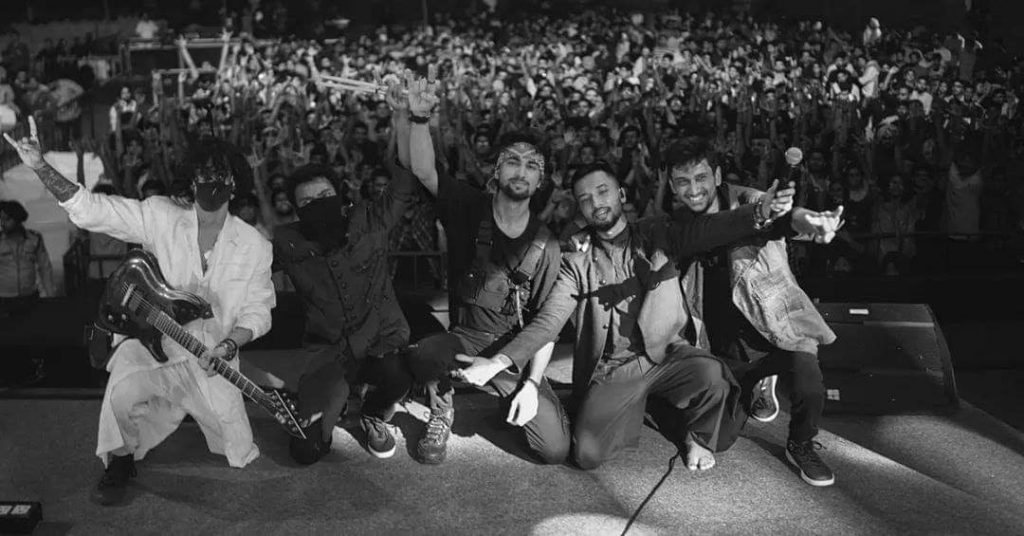

Rishabh Seen is a musician who has the experience of two dimensions of music that are totally opposite, a classically trained sitar player who is also a metal enthusiast.
24-year old Rishabh Seen inherited his knack for classical music from his family. Originally from Jalandhar, Punjab, his family has yielded several talented artistes like his grandfather, Ustad Lachhman Singh Seen, a prominent tabla player. He also happens to be one of the last living disciples of tabla maestro, Mian Qader Baksh. The musical genes carried on further with Ustad Manu Kumar Seen whose instrument of choice was the sitar.
“My first memory might have been music itself. My father’s students used to come to my place and practice for six-six hours. And I was introduced to the life of a classical musician pretty early, ” says Seen while recounting his childhood. He had initially picked up vocals and the tabla to master his rhythm but eventually moved on towards the sitar.

If there was one incident that piqued his interest towards the stringed instrument, it has to be his father’s performance at Harivallabh Sangeet Samellan, that happens to be the oldest Hindustani classical music festival. “This was the first time I saw my dad perform on the stage. And I saw how the audience were reacting to his music, his vibe. It was so mind-blowing that I held my father’s sitar the next morning and started practicing the basic sargams. I was so moved.”
This moment of musical enlightenment occurred to Seen when he was about ten years old. As he entered his teens, he had a whole rock phase when he turned into an avid Nirvana fan. As time passed, Seen got introduced to metal music in early 2010s. The music of bands like Slipknot opened up a new world to him, a world where musicians can express their emotions on the stage, without any restrictions. This attitude was a far cry from the stereotypically uptight and formal classical music scene.
While Seen carried on bettering his skills at the sitar, metal music never left his mind. For instance, in his bus rides from Punjab to Delhi (where he attended Hindu College for a little while), he used to listen to nothing but metal for six to seven hours.
When college commenced, Rishabh Seen joined several bands but that experience gave the young sitarist quite some reality checks. “At times, I felt like I’m a second-class musician just because I played the sitar. The sound equipment guys at the venues wouldn’t give me the same respect as a guitarist or somebody else. And I wanted to change this outlook. I took it as a challenge to do something new.”
One thing led to another and Seen took it upon himself to replicate the effort of a guitar on his sitar, without ruining the sanctity of his instrument.
Even though he can’t read Western sheet music, Seen was pretty determined to figure out a unique sound. One of his earliest examples was a cover of the song, Tempting Time by an American instrumental metal outfit called Animals As Leaders.

“I had uploaded the cover one night. And the next morning, I woke up expecting 30-40 views. But the video had 10,000 views. And I was like, ‘This is insane!’. In fact, Seen’s online popularity only grew from thereon with his YouTube covers garnering thousands of views. One of his videos even caught the eye of Metallica frontman James Hetfield! ‘It was nerve racking to see it, I couldn’t believe what I was looking at but as I came back to my senses all teared up, I realised that if my work could reach this man & he appreciates what a 21 year old Sitar kid from Punjab did, I think that kid is on the right track.”
But rather than just being an unconventional gimmick, Seen decided to take his fusion of sitar and metal to the next level after forming Sitar Metal. Sitar Metal is Seen’s instrumental band that prides itself on claiming that it’s world’s first sitar-fronted Indian classical metal band.
With just one self-titled album from this year, Sitar Metal is slowly gaining momentum. “Firstly, I wanted to show that the Sitar is a versatile, limitless & futuristic instrument both inside and outside of Indian Classical music and do this without changing its sound and look at all. Secondly, realising my equal love for Indian Classical & metal music and making a metal band that was ‘fronted’ by an Indian Classical instrument entirely,” Seen explains his incentives for helming his unique fusion.
It was roughly between 2015 and 2019 that Sitar Metal acquired its present line-up. Initially, Seen got in touch with his friend Bhaskar Roy who currently serves as the band’s manager. The next recruit was Tushar Khurana, a bassist and another one of Seen’s friends. Both Seen and Khurana had grown up together and were even a part of the same school band, a group named Calling Emily in which Khurana played bass and Seen played the drums. Khurana had however taken a sabbatical from music to focus on a day job. It was only in 2017 that his sitar-playing friend convinced him to take the risk of becoming an independent musician.
“For me, more than a great musician, I need a great human. Over time and with practice, one can be a better musician. But a better person, not always.” Seen explains why most of his associates are people whom he’s closely attached with. Guitarists in Seen’s friend circles were very much
fascinated with the sitar. This explains tons of guitarist friends on his Facebook. The sitarist similarly connected with Kolkata-based guitarist Deeparshi Roy and Roy has served as the band’s lead guitarist thereon. Sitar Metal’s sound engineer Souvick Roy also connected with the band
through the grapevine, being a close associate of Bhaskar Roy.
The latest member to join the troupe has been Joel Damian Rodrigues who serves as Sitar Metal’s drummer. As he puts it, “I auditioned for the band in September 2019, I sent them a video of me covering their songs & in a few days I got the call to be in Sitar Metal as the band’s drummer.”

The band has slowly and steadily garnering a fanbase with concerts and their last instrumental album. The sitarist elaborates that he’s pretty happy with the band garnering a consistently rising base on YouTube and over a thousand listeners on Spotify. “One should understand that ours is a sitar fronted band,” he says, “so, it’s a big thing even if 500 people listen to us. It might not be a thing for a genre like rap and I’m well aware of that.”
His father, the legendary sitarist from Jalandhar, is still extremely proud of his son carving his own musical identity. As for the classical scene, Seen
admits that some are a bit reluctant to appreciate his blend of sitar and metal. “I think that’s a problem in every field, when someone experiments with new stuff. They have a problem with my tattoos, and all that…” he
says jokingly.
But as guitarist Deeparshi Roy adds, the band has surprisingly been getting positive feedback from their newly-converted fans. “Sitar Metal has re-ignited the interest of people in Sitar & Indian Classical music. At our shows we have literally seen hardcore Indian Classical musicians, Metal musicians, Hip-hop musicians, students of fashion walk in with their grand ethnic wear, in competition to band’s kurtas and sherwanis which is such a nice thing, all walk into the same venue & buy tickets to see Sitar Metal,” Roy says.
With the pandemic season leading to a lull in live performances, the band is currently working on their next album. “The pre-production of the next Sitar
Metal album has begun & so the entire team is focused currently on this project, for both the audio & visual side,” bassist Tushar Khurana explains.
As of now, their first album Sitar Metal is indeed a visionary work when it comes to instrumental music in India. While the sitar has been actively used in fusion performances and has had an international presence with sitarists like Pandit Ravi Shankar, no band has ever attempted to be led by a sitarist. The sitar as an instrument has mostly been seen as a novelty, or a supporting instrument. With Sitar Metal, Rishabh Seen unleashes great potential for sitarists to reinterpret classical music for the modern age.
Deeparshi Roy describes the project as, ‘‘This album is supposed to ground you in the struggles of life, make you feel that chaos and uncertainty but in the end show you what it feels to resolve everything with your sheer willpower and breaking all the shackles that hold you from flying high & see all the possibilities within you.” Sitar Metal’s first album that was mostly well-received is a 10-track record that deals with a multitude of
themes, without getting pretentiously abstract.
And even though, the band is largely an instrumental collective, they do experiment with other tricks every once in a while. “In the first album we also presented our love for shayari, voice-overs, rap, electronic & ambient music as well & that shall also always stay a part of the sound too because we love ghazals, we love shayaris, we love thumris, we also love Travis Scott & we all vibe to Slayer of course.” says drummer Joel Damian
Rodrigues.
Even though he still is pretty young, Seen has engaged in several musical pursuits from being trained under his father to touring with Bollywood playback singer Arijit Singh. But finally, he seems to have found his footing with Sitar Metal. From being seen as a ‘second-class artist’ to fronting his own one of its kind band, the sitarist from Jalandhar has come a long way…